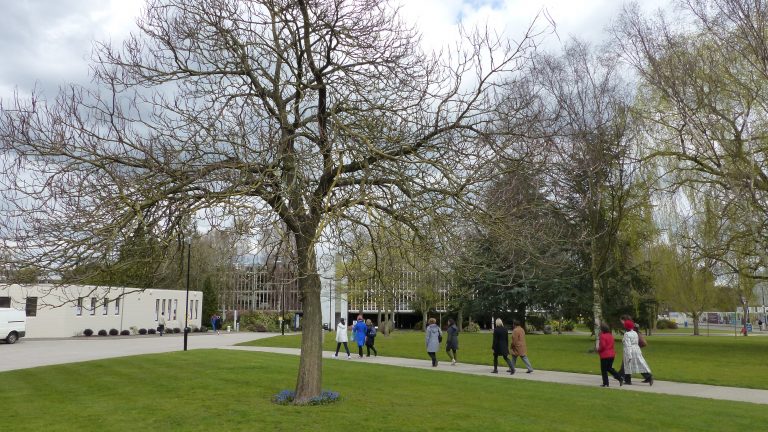The weekly Wellbeing Walk is a breath of fresh air for your mind and body… by Annette Kinsella.
I wandered lonely as a cloud, said William Wordsworth. He clearly wasn’t a student at Warwick, because if he’d decided to wander here he could have joined in with the Wellbeing Walk, which takes place weekly around campus.
As we all know, mindfulness is the buzz word of the moment – there’s even a Parliamentary group looking at ways of bringing it into policy making. For the uninitiated, mindfulness is a kind of meditation, inspired by Buddhism, which involves focusing on the present, rather than on the stresses of the past or future.
But although mindfulness has been received with enthusiasm by many of us seeking a more positive outlook, it’s not for everyone. So if you want to relieve stress but are not yet ready to live in the moment, the Wellbeing Walk – a circular walk which starts from outside the library café, and takes a number of different routes across the university – could help you.
There’s no doubt that getting out into the fresh air helps us to appreciate the beauty of the Warwick campus. We’re only a stone’s throw from Leamington and Coventry but next to the tranquillity of the lakeside, joined by lines of ducks and splashes of daffodils, it’s easy to imagine yourself in the Lake District alongside William and his clouds.
Aside from enjoying the aesthetics, there’s a raft of reasons why taking a short walk can improve health. Here’s the top five:
Walking raises your energy levels.
Forget the Red Bull to keep you going when the afternoon slump sets in – walking is one of the best natural energisers around. Walking will boost your circulation and the supply of oxygen to your body.

Walking strengthens your heart
A regular walk have as much benefit as running, according to a new study conducted at Lawrence Berkeley National Laboratory. Researchers found that a brisk walk could lower the risk of high blood pressure, high cholesterol or stroke to the same extent that a shorter sprint would. To see the same benefits, walkers need to complete a 30-minute journey every day. So the wellbeing walk is the perfect place to start honing good habits.
Walking helps you lose weight and tone up
You can burn around 75 calories by walking at 2mph for 30 minutes. If you increase your pace to 3mph, you will burn 99 calories, while going for the burn at 4mph will rid you of 150 calories, or three Jaffa cakes and a jam doughnut. Just don’t treat yourself to a bun in the café afterwards.
Walking prevents dementia
Regular walks can slow down brain shrinkage associated with dementia, according to researchers at the University of Pittsburgh. The study, which looked at 100 subjects aged 60 to 80 found that taking a short walk three times a week increased the size of the prefrontal cortex and hippocampus – the parts of the brain linked to planning and memory.
Walking boosts vitamin D
Exposure to Vitamin D, which the body can absorb through sunshine, increases levels of serotonin, the ‘happiness’ chemical. Harvard University doctors say that just fifteen minutes walking on a sunny day can increase Vitamin D levels.

But apart from the health benefits that the Wellbeing Walk can bring, the main reason to attend is that it’s (whisper it) fun. When else, during a busy day at university, do you get time to collect your thoughts, to notice a line of ducks waddling proudly towards the lake, to spot a rabbit dashing to safety, to watch a panorama of clouds scudding across the sky? It may only be 30 minutes, but it’s a chance to recharge your batteries, to mull over problems issues and to reconnect with your surroundings. Even Wordsworth admitted:
For oft, when on my couch I lie
In vacant or in pensive mood,
They flash upon that inward eye
Which is the bliss of solitude;
And then my heart with pleasure fills,
And dances with the daffodils.
So don’t be like Wordsworth – get off the sofa (or out of the office chair) and join in with the Wellbeing Walk
Like this? Tweet this!
#studyblog
